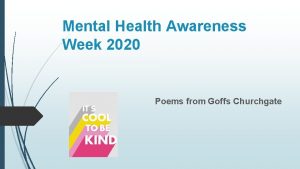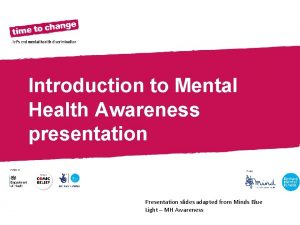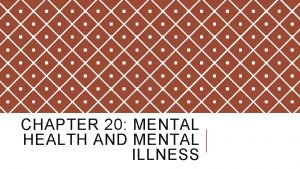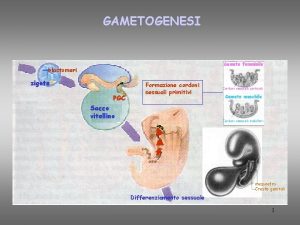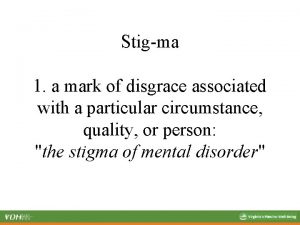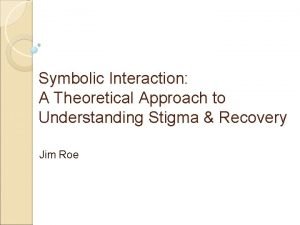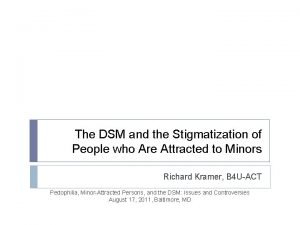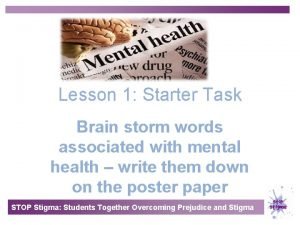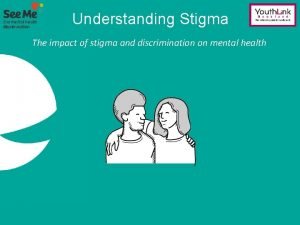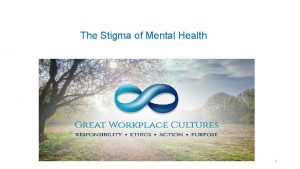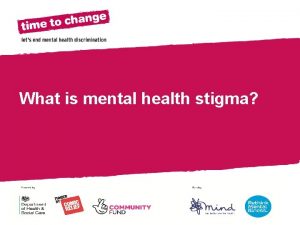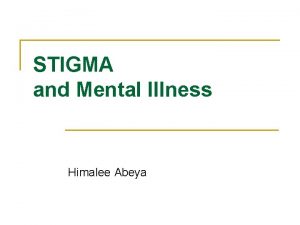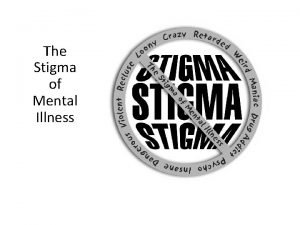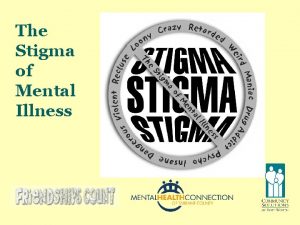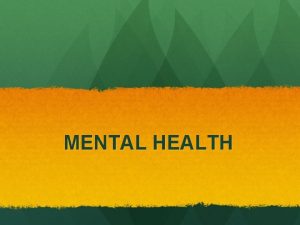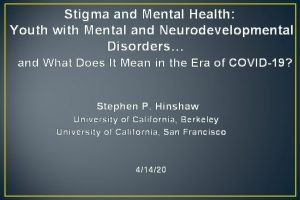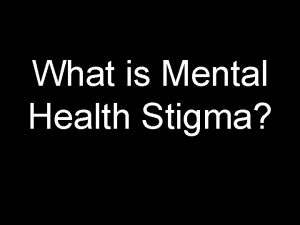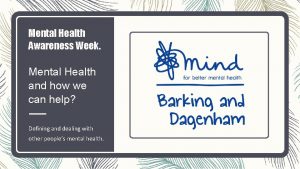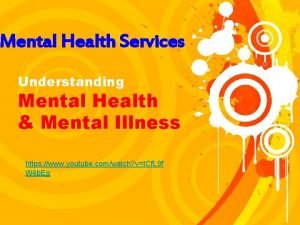End the Stigma Mental Health Awareness What is



















- Slides: 19

End the Stigma Mental Health Awareness

What is mental illness? • The American Psychiatrist Association describes mental illness as health conditions involving changes in emotion, thinking, and/or behavior. Mental illnesses are associated with distress, confusion, stress, and can cause issues with functioning successfully in one’s social, work, or family life. In a given year: • One in five US adults experience some form of mental illness • One in 24 has a serious mental illness • One in 12 has a diagnosable substance use disorder

How is it diagnosed? Sadness, anger, elation, mood swings are all normal emotions one experiences depending on what is going on in their life. However, if you notice that you feel “off” or different, you feel your emotions aren’t typical, what you feel isn’t “normal” for you, your thoughts/feelings/behaviors suddenly change then a thorough mental health evaluation may be warranted. This evaluation can involve blood work, neurological testing, multiple consultations with psychologists or psychiatrists, and trial treatments to see if mood and/or behavior improve. Please see your primary care physician if you feel that you may have an underlying mental health condition. They will be able to refer you to someone with specialized training in mental health conditions.

Treatment • Treatment for mental illness can be multi-faceted. It can involve: • • Medication(s) Individual counseling Group counseling Substance abuse treatment (to treat self-medicating issues to treat the underlying mental illness) • Family counseling • Other treatment options recommended by your provider

Why the stigma? • Many people ask why is there a stigma against mental health? The answer is complicated. Talking about mental illness has been a taboo topic for many years. It was something you never talked about whether it was your own mental illness, that of a family member, a neighbor, or someone you met in your daily life. People with mental illnesses were put into mental institutions and sometimes never seen or heard from again. Talking about mental illness and mental health treatment is something that people are still becoming comfortable admitting to themselves and others and admitting that they need treatment.

Why the stigma? • Mental illness is also invisible. You can see that someone has a broken leg or missing a limb. You can see someone with tremors or see that they have no voice. Unless someone has visible tics or physical symptoms (think talking to themselves or physical signs of stress) you cannot see their mental illness. You don’t hear a person’s inner dialogue to know what their thinking or feeling every moment of the day. For all intents and purposes the person appears to be normal, but inside their brain is waging a war with their mental and emotional health. Many have a hard time believing what they can see.

How do we end the stigma? • By not being afraid to TALK about mental illness. Mental illness exists. People are diagnosed daily. It is OK to not be OK. It is OK to struggle. It is OK to have a diagnosable mental illness. • By not being afraid to ADMIT you’re struggling with a mental illness. Be an advocate for others will your mental illness. Be an advocate for those struggling with their mental health. Be an advocate for mental health treatment. Be an advocate for change so that others won’t be afraid to say “I’m not OK and I want to do something about it for myself and others around me”.

What can you control?

Why is control important? • Knowing what we can and can’t control is highly important when speaking about mental health. Mental illnesses can make a person feel out of control mentally and emotionally and often times people seek control of outside influences and experiences. Knowing what you can and can’t control can help you to focus your energy in a productive way and help you FEEL in control of your mental health. Control and feeling successful are key in safeguarding your emotional and mental health when often times you don’t feel in control of your body or thoughts.

Where can I find help and support? • I’m so glad you asked where can I find help? Or where can I go online, especially during this pandemic, to find support? • Endthestigma. org – They are currently doing a series of #nofilter where people are unashamedly sharing their stories about their mental illness and how they’re getting help. • Seizetheawkward. org -- https: //youtu. be/RIow. IKz. Eg. T 0 • Itgetsbetter. org – A positive site for those in the LGBTQ+ community to hear stories from others in the community about living life to see how it gets better.

Where can I find help and support? • Teenmentalhealth. org – A great informational website that describes various mental illnesses and or brain disorders and how to help. This site is great for a teen who wants to learn more or for parents and educators that are wanting to help their children or students. • Mentalhealth. gov • National Institute of Mental Health -https: //www. nimh. nih. gov/index. shtml

Apps • • • The Mindfulness Headspace Stop, Think, Breathe What’s Up Mindshift Happify 365 Gratitude Journal Smiling Mind Daily Water Slumber Productive

How to help myself/others Recognize signs of distress • Cognitive Signs • Confusion, forgetfulness, concentration Issues, difficulty making decisions • Emotional Signs • Fear, worry, anxiety, anger, guilt, irritability, sadness • Physical Signs • Stomach ache, headache, muscle tightness, change in energy level • Behavioral Signs • Change in sleep habit, change in eating habits, difficulty carrying out daily tasks, crying

Mindfulness Activities • Just One Breath • Sit comfortably, set timer for 1 minute. Have breathe deeply in and out while paying attention to how you feel and what you hear. Take another slow deep breath and imagine the air moving down your lungs and back out. One more deep breath and hold for a moment, then release. • Heartbeat Exercise • Do jumping jacks or run in place for one minute. At the end of one minute, have them place hand on their heart and pay attention to how heartbeat and breathing feels. • Tense & Release Muscle Relaxation • Starting at the feet, gently squeeze the muscles in the feet by tightening them for 5 seconds, then slowly releasing. Next squeeze the large muscles in the calves for 5 seconds, then gently release. Work your way up the body for more relaxation.

Mindfulness Activities • One Good Thing • Sit up straight, Shoulders back. Put your hands on you lap, look down or close your eyes if comfortable. • Think of a positive thing. How did it make you feel? How does it make you feel now? Take some deep breaths… 1… 2… 3…. Slowly open your eyes back open. • Grounding Exercises • Use your 5 senses to connect with your senses and connect with the world around you. Helps manage stress/anxiety. Helps with self-regulation, promotes positive emotions and self-compassion.

Mindfulness Activities • Blowing bubbles. • Explore textures in nature, take a walk to collect several different objects and observe/describe how each feels. • • • Practice noticing with art. Choose several different utensils and describe how they all feel different on paper. Take a mindful walk pointing out sights and sounds along the way. Slow down by having a snack in “slow motion” and taking notice of the taste throughout. Try a playful guided meditation together. Use a happy moment to “soak in the good” by pausing to observe the pleasant physical and emotional feelings present. • Sit down and “color your feelings” together depicting each emotion with a new color. • Listen to some music and see how many instruments you can hear. • Explore gratitude by naming as many things possible that you are grateful for.

School Social Workers Jaqueline Watkins jnwatkins@k 12. wv. us Terri Beaty terri. beaty@k 12. wv. us School Counselors Long Drain School, Teresa Sleeth teresa. sleeth@k 12. wv. us Hundred High School, Beverly Van. Scyoc bvanscyo@k 12. wv. us New Martinsville, Valerie Clark, Chad West vaclark@k 12. wv. us, cwwest@k 12@wv. us Magnolia High School, Robert Gomez, Rebecca Mc. Clain robert. gomez@k 12. wv. us, remclai@k 12. wv. us

Paden City Elementary School, Jason Bennett jason. a. bennett@k 12. wv. us Paden City High School, Kelli Meeks kelli. meeks@k 12. wv. us Short Line School, Sherry Croasmun scroasmu@k 12. wv. us Valley High School, Jessica Mace jessica. mace@k 12. wv. us

Wetzel County Schools and Support • Whether school is in session or we’re out during this pandemic know that we are here for you! Please feel free to reach out to either school social worker or your school’s counselor. We will do what we can to help you through any crisis you may be experiencing whether it’s increased anxiety and stress, a loss of a loved one, friendship issues, or other feelings relating to the current pandemic. Please don’t hesitate to email or reach out through whatever means your counselor has made available to you.
 Objective for mental health awareness
Objective for mental health awareness Poem on mental health awareness day
Poem on mental health awareness day Titles for mental health presentation
Titles for mental health presentation Chapter 20 mental health and mental illness
Chapter 20 mental health and mental illness Mental health jeopardy questions
Mental health jeopardy questions Privacy awareness and hipaa privacy training cvs answers
Privacy awareness and hipaa privacy training cvs answers Plant parts name
Plant parts name What is multigrade
What is multigrade Ovogoni
Ovogoni Stigma style ovary
Stigma style ovary The mark
The mark Stigma is a mark of disgrace
Stigma is a mark of disgrace Associatief stigma
Associatief stigma Anther and stigma
Anther and stigma Symbolic stigma
Symbolic stigma Stigma image
Stigma image Pollen tube grows through
Pollen tube grows through Stigma image
Stigma image Keratan membujur sekuntum bunga
Keratan membujur sekuntum bunga What is stigma
What is stigma

